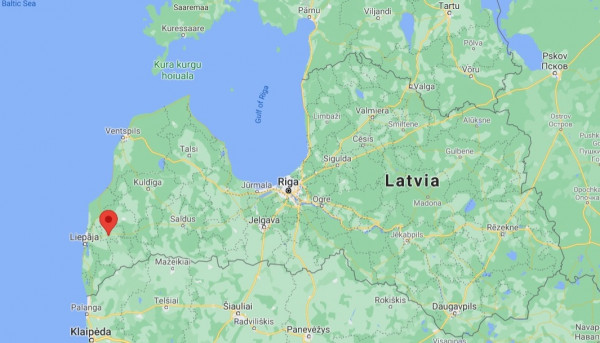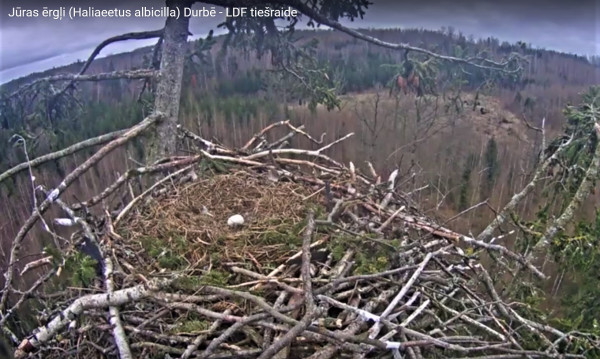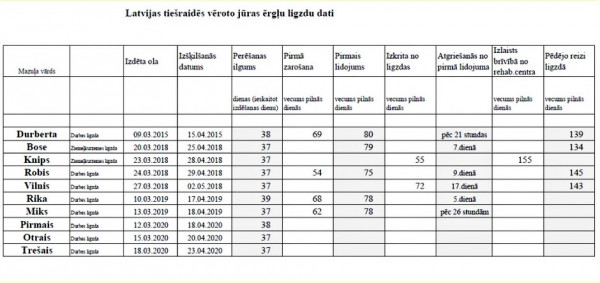The tragedy in Durbe shook the watchers of the white-tailed eagles' nest around the world
A pair of eagles have been staying in the white-tailed eagles' nest in Durbe since 2017, and the live stream viewers of the nest had given them the names Milda and Raimis. This nesting season has been dramatic. Even experienced ornithologists were surprised by some of the events. Unfortunately, it ended tragically. Some live stream viewers found the latest events too emotionally difficult to watch.
This year's nesting for the white-tailed eagle family Milda and Raimis started as usual. On March 12, Milda laid an egg and began hatching, but Raimis, as an experienced breadwinner, carried food to the nest, switched with Milda from time to time so she could exercise her wings, and bravely repelled other eagles that had had their eyes on the nest or Milda. The most diligent observers noticed the second egg on March 15, and the third on March 18. As eagles hatch from an egg after about 38 to 40 days, the new generation of eagles was expected in the second half of April. At that time, nothing seemed to threaten the idyll. Milda and Raimis have been staying in this nest for several years, raising a pair of eagles every year, and those who had watched this pair of eagles for several years were convinced that Milda and Raimis were caring parents.
Days without food
However, on the evening of March 27, Raimis flew away and did not return. What happened to the noble bird is unknown. Ornithologist Jānis Ķuze at the time guessed that, most likely, the bird was either dead or seriously injured. "We can only guess what the real reason is, and there are many options. Given the events of recent days and the appearance of a new pair of eagles, an intra-species conflict is a plausible explanation,” said J. Ķuze.
Milda waited patiently for her partner, sadly calling out for him from time to time. The first question in the online chat asked by those who only joined the live stream occasionally was, "Has Raimis returned?" And the answer was always, "No, he hasn't." The Latvian Fund for Nature also acknowledged that events are taking place in the white-tailed eagle's nest in Durbe, which this nest has not yet experienced - the white-tailed eagle male Raimis has disappeared, but the female Milda does not leave the nest and continues to warm the eggs, going without food for days.
When Milda sat on the eggs without eating for the fifth day, people in the chat room discussed how long Milda would be able to endure without food, and wondered how to bring some fish near the nest. Ornithologists strongly advised not to do so. "Milda is a healthy and strong adult bird - she is now amazingly patient in protection and incubation of her eggs, but it is a matter of time - when the feeling of hunger will prevail, she will leave to search for a prey. It is not desirable to bring food to the nest, for example, with a drone - any interference, noise, unusual object would frighten both Milda and the other eagles, and thus create a risk of abandonment of the nest. In addition, it would not be possible to feed the incubating bird and then the juveniles by external intervention, only the birds themselves can do it. Milda could cope alone, if there was one half-grown nestling in the nest - it would be possible to feed it by one of the adults,” J. Ķuze emphasized.

Listening to the advice of ornithologists, not to look for a nest and not to try to interfere in the life of birds, the spectators had no choice but to watch what was happening.
When Raimis disappeared, Milda lost much-needed support. From time to time, some new suitors appeared, but they were interested only in Milda, not in hatching eggs, and the pair of eagles eyeing the nest for themselves did not let off.
Since none of the new suitors would bring food to Milda, she had to go in search of it herself, leaving the nest unattended and the eggs unheated. At first for a shorter time, but there were days when Milda's eggs had been left in the nest alone for even more than five hours. Most of the live viewers who followed the events on the nest were glued to their screens. During Easter, some houses had unbaked pies, others had unpainted eggs.

Viewers of the nest doubted whether any chick would hatch at all, given the long time the eggs were left without warming. After searching for food, Milda always returned, rustled the nest, moved the eggs and sat down to keep hatching. About two weeks after Raimis disappeared, an unknown eagle appeared near Milda, which the nest watchers called Čips because of its high and chipper voice. He was a rare suitor that Milda didn't bite as he approached the nest. Milda allowed him to take care of the nest at least partially. Čips, it seemed, at least knew how to build a nest and how to hatch eggs.
And a miracle happened. Despite the dramatic events, on April 21, the first chick of this year's hatching emerged. Even the experienced ornithologist Jānis Ķuze admitted that it was a really unexpected event. "This is a notable case when the opportunity given by live broadcasts to look at the nest has provided new information about the developments in the life of eagles. The chick has hatched, but it is still fundamentally important that the young male brings them food. We saw that the male provided support for hatching, which allowed the chick to hatch, but we do not know whether it will continue to play the role of the male in feeding the chick. If the male continues to support the nest, warms the chick, but the female goes out for food, then it would be an inverse division of roles for the pair of eagles. So, we continue to observe and follow the developments,” commented J. Ķuze at that time.
Čips really brought food, warmed the chick and two eggs that had not yet been hatched. The audience was ready to deck him in gold if they could. This gave hope that Čips would become a caring foster father. Live viewers, already numbering in the thousands, were glued to the events of the nest, watching the little bird flutter. In addition to Latvian, the online chat showed entries in Russian, English and even languages that Google could not translate.
On April 24, the second chick emerged from the shell. Milda fed both of them with a crow brought by Čips and warmed them as much as she could - a storm was raging in Kurzeme, sometimes soaking Milda with raindrops, sometimes covering her with a layer of wet snow. On Sunday, April 25, Milda left the nest several times for a few minutes, leaving the young birds alone. The older chick took the opportunity and started poking the smaller chick, and the two shifted over the remaining egg, which was also near hatching. At one such moment, when the young birds were left alone, Čips suddenly flew to the nest and stole the crow. Milda hurried back and tried to take the food back from Čips, but she failed. Viewers who watched it live admitted in the chat that they held their breath while watching it. Some have even managed to knock back half a bottle of valerian tincture. After an unsuccessful attempt to take away Čips' prey, Milda pulled a hidden fish out of the nest and immediately ate everything, not giving the little eagles even a mouthful. Until then, Milda had fed her children every few hours. Sunday night at Durbe's eagles' nest was gloomy - a storm was raging and there was no food left.
The morning of Monday, April 26, in the white-tailed eagles' nest began with a tragedy - at dawn Milda left the two little eagles alone for several hours. Čips could not be seen anywhere nearby. It is not known whether he really wasn't nearby or was just tired of playing "family". When Milda returned, the little eagles, left alone in the cold for several hours, had been frozen to death.
...and then Milda ate the two chicks
Ornithologist Jānis Ķuze, commenting on what happened, says: "Nature is nature."
He explains that the decisive factor for such an outcome was a lack of food. Under normal circumstances, when the chicks have just hatched, the male would bring food to the nest in a few hours. "Last year we could see that the nest was literally loaded with fish and other food, but the young male's instinct was not so strong, so the food supply was fragmentary and insufficient. For these reasons, the female's behavior also changed, and she left the nest and the chicks. When the chick no longer shows signs of life with movements and sounds, it turns into food for the female, and it is perfectly normal for the dead chicks to be eaten,” he explains Milda's actions.
J. Ķuze emphasizes that it is important that the female has survived. "Right now, we hope that the female will continue to stay in the area, form a new pair, and have a successful nesting next year."
For the next few days, Milda continued to hatch the remaining egg, but then left it as well. A few days later, another eagle saw the abandoned egg in the nest and ate it.
You can read about inter-species conflicts between birds in the article "Birds can outdo even the cruelest people in their actions."
You can follow the events in the white-tailed eagles' nest in Durbe here. At the moment, the nest is empty, and occasionally some eagle, little bird or squirrel visits it.
You can comment on what is happening in the nest in the Dabasdati.lv forum in Latvian and in the Looduskalender.ee forum in English.

*****
Be the first to read interesting news from Latvia and the world by joining our Telegram and Signal channels.
